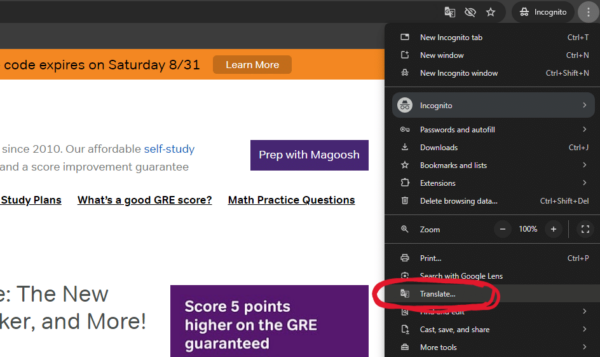
Preparing for the GMAT exam can be a daunting task, especially if English isn’t your first language. The verbal section, in particular, poses unique challenges that require a strategic approach and diligent practice. If you are looking for advice on how to modify or supplement your GMAT study schedule, you’ve come to the right place. If you’re just looking for advice on how to approach the GMAT as a non-native English speaker, you’ve also come to the right place. Read on for tips and strategies that will help you excel in preparing for the exam.
Click here to skip to modifying your GMAT study schedule as a non-native English speaker.
Top GMAT Tip for Non-Native English Speakers
The number one thing you can do to improve your verbal performance on the GMAT is to read English as much as possible. There is simply no better way to improve than through A LOT of practice. The upside to all this reading is that you will not only boost your vocabulary, but also your comprehension skills — your ability to digest meaning and decipher the author’s intent. This is a crucial skill for the GMAT verbal section.
GMAT Reading Comprehension Advice
All those preparing for the GMAT should try to read for at least 30 minutes per day. However, if you are really struggling with GMAT Verbal and can afford the time, make it at least one hour per day.
How to Read to Prepare for the GMAT and Increase Fluency
It’s important to read materials that are similar to what you’ll see come test day. Consider such venerated publications as The New York Times, The New Yorker, The Economist, and Arts & Letters Daily. Take a look at our full list of recommended periodicals. Or, if you prefer books, check out our recommended fiction & non-fiction (this list is written for the GRE, but all the picks would suit the GMAT as well).
- Active Reading: Practice reading actively by summarizing paragraphs, identifying main ideas, and noting key details. To delve deeper into this crucial skill, check out our post dedicated to active reading.
- Annotation: Make notes and highlight key points while reading to improve retention and understanding.
- Summarization: After reading a passage, write a brief summary in your own words to ensure comprehension.
- Vocabulary Building: Use your most effective method (flashcards often work well) to record any and all words that are new to you. Part of your GMAT study should be to review these words often.
- Translation Tools: Use them to support your efforts but always remember that there is no escaping the need to enhance your English vocabulary if you want to improve your GMAT verbal score. We’ve highlighted Google’s translation tool here:

Modifying Your GMAT Study Schedule for Non-Native Speakers
We understand that suggesting you read for 30 minutes to one hour each day is no small task. You might be wondering how to find the time, especially if you’re trying to diligently follow each and every item in your Magoosh Study Schedule–we know each day is already packed. But! You don’t have to follow the study schedule to a T. The schedules were designed to be modified based on an individual’s strengths and weaknesses. If, as a non-native English speaker or someone weaker in verbal, it’s in your best interest to read for an hour (or more) each day as well as have time to record and review any unfamiliar vocabulary, you should feel free to modify the demands of the schedule in whatever way best suits your GMAT success.
Let’s say that you are already really strong in Quantitative Reasoning (QR) concepts. Well, if that’s the case, at the beginning of each week, look through the QR content to see whether you already know the content of a lesson or just need to lightly review it. If you’re confident you know the concepts, you could either skip those lessons completely or maybe just skim through any for which you only need a brief refresher. All the time that you don’t need to devote to QR can then be applied to reading and more GMAT verbal practice.
Please Note: We recommend that you don’t completely skip any given lesson’s associated practice questions because your performance on those questions will reveal any unexpected weaknesses and lessons that you should, in fact, review more fully.
Advice for Complete Beginners Who Can’t Skip Any Content
If you find that it’s not in your best interest to skip any of the lessons in your schedule, you still need to do your best to practice reading as much as possible, especially if you are a non-native English speaker who finds the vocabulary and sentence complexity of GMAT verbal difficult to navigate. Unfortunately, the best way to see a significant improvement in your verbal score is to become as comfortable as possible with reading higher-level English texts, and that takes time. Be honest with yourself. If you cannot add time to practice reading each day as well as knock out all the lessons and practice in the schedule, at the bare minimum, can you fit a longer reading session into a sixth or seventh day?
If there’s simply no way you can incorporate the reading you need to do to help you improve your verbal score into your current study schedule, you might need to consider increasing the total amount of time you’ve allocated to studying for the GMAT. Many non-native English speakers give themselves up to a year or more to prepare, specifically because of the need to be as comfortable as possible with the English complexity they’ll encounter on the GMAT.
Final Thoughts
It will not be easy to catch up with native speakers on an exam like the GMAT. Preparing for the verbal section of the GMAT exam as a non-native English speaker requires dedication, practice, and strategic planning. Hopefully, you now feel empowered to modify your study schedule in a way that will help you significantly enhance your performance. And, remember, be kind to yourself. Improving in verbal can feel like an uphill battle but maintaining a consistent effort and a positive mindset are key to achieving your desired score.
Magoosh has helped thousands of non-native speakers with a range of Verbal concepts, from simply defining words to making sense of an author’s implied arguments on the critical reasoning section — so check out Magoosh GMAT today! Try us out for free with a 1-week trial.
Happy studying!





